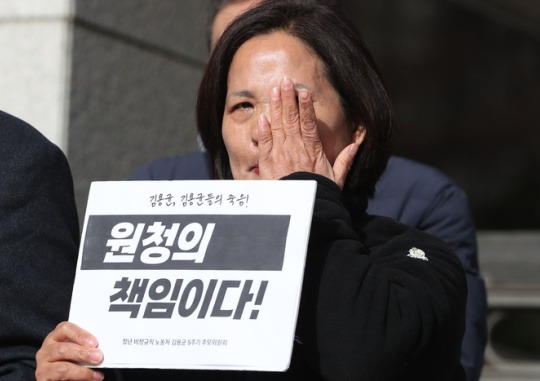The Supreme Court rules the acquittal of contractor in young worker’s death
이 글자크기로 변경됩니다.
(예시) 가장 빠른 뉴스가 있고 다양한 정보, 쌍방향 소통이 숨쉬는 다음뉴스를 만나보세요. 다음뉴스는 국내외 주요이슈와 실시간 속보, 문화생활 및 다양한 분야의 뉴스를 입체적으로 전달하고 있습니다.

The Supreme Court has acquitted Korea Western Power (KOWEPO) and its former CEO Kim Byung-sook of their charges relating to the death of Kim Yong-gyun, a temporary mechanic for a subcontractor, who died after being caught in a conveyor belt while working at a power plant in Taean, in Chungnam Province.
Kim's death became a catalyst for the revision of the Occupational Safety and Health Act and the enactment and implementation of the Serious Accidents Punishment Act to make contractors take a bigger responsibility for workers’ safety and accidents occurred in their facilities, but the revised laws were not applied in Kim’s case. Five years have already passed since Kim was killed at the plant.
On December 7, the Supreme Court dismissed the appeals of both the prosecutor and the defendants in the case of the contractor and the subcontractor that were charged with professional negligence resulting in death and the violation of the Occupational Safety and Health Act.
As a result, the original ruling was confirmed, which acquitted the contractor and its CEO and convicted other staff of the contractor and the subcontractor. The Supreme Court said, "There was no misunderstanding in the legal principles regarding the violation of the duty of care at work, the violation of the duty of safety measures in violation of the Occupational Safety and Health Act, predictability, and causal relations."
Kim, who worked as a maintenance worker of the subcontractor at a power plant in Taean was found dead on December 11, 2018, four hours after being trapped by a running conveyor belt which was used for transporting coal. At the site, the cover of the conveyor belt inspection hole had been removed and there was no other staff near Kim who had to do such dangerous work by himself. In August 2020, prosecutors indicted the contractor, the subcontractor, and 14 employees of the companies on failing to fulfill their safety duties to prevent the accident, resulting in Kim's death.
The key issue of the trial, where the original Occupational Safety and Health Act was applied, was whether there was a "substantial employment relationship" between the contractor and the subcontract worker. The trial court acquitted former CEO Kim of the charge of violating the Occupational Safety and Health Act, saying, "It is admitted that the contractor was involved in the personnel management of the subcontractor, such as hiring new workers and setting schedules for workers, but it is difficult to admit that there was an actual employment relationship when considering unique organizational and working systems of the subcontractor.” The court also acquitted the contractor and its staff of the charges of professional negligence resulting in death on the grounds that they were not aware of the risk of the conveyor belt or problems in the contracts with the subcontractor. Two employees at the contractor convicted in the first trial were also acquitted in the appellate court.
The Supreme Court's dismissal of the appeal also confirmed the sentences of those convicted in the lower court. Ten executives and subcontractors, including Baek Nam-ho, former president of Korea Development Technology, and Lee Geun-cheon, former head of Taean, were convicted after they were found guilty of failing to fulfill their duty of care and to comply with safety measures required by the Occupational Safety and Health Act.
The Supreme Court's rejection of the appeal also confirmed the sentences of those convicted in the original trial. 10 employees at the contractor and subcontractor were found guilty of failing to fulfill their duty of care and to observe safety measures required by the Occupational Safety and Health Act. They were all sentenced to fines or probation in the first trial, which were mostly reduced on appeal. No one was sentenced to prison in this case.
Kim's death, which was highlighted as a symbol of the "outsourcing of risk," became a trigger for legislation to strengthen the management and supervision responsibilities of contractors.
Kim's death, which was regarded as a symbol of "dangerous outsourcing," served as an opportunity for legislation to make contractors have a bigger management and supervision responsibility.
On December 27, 2018, shortly after the accident, the so-called “Kim Yong-gyun Act,” or the amendment bill of the Occupational Safety and Health Act, passed the plenary session of the National Assembly. The amendment stipulates that “the contractor shall take necessary safety and health measures when subcontract workers are working at its workplace. The Serious Accidents Punishment Act, which allows the punishment of the contractor in the event of a fatal accident, also came into effect on January 27 last year.
If the Serious Accidents Punishment Act existed at the time of Kim's death, Kim, former CEO of the contractor, could not have avoided criminal punishment. Nevertheless, the government is trying to suspend the application of the Serious Accidents Punishment Act for another two years for workplaces with less than 50 employees. Some laborers criticized that the ruling was too conservative even if it is based on the original Occupational Safety and Health Act, not the Serious Accidents Punishment Act.
※This article has undergone review by a professional translator after being translated by an AI translation tool.
Copyright © 경향신문. 무단전재 및 재배포 금지.
- “나도 부정선거라 생각했었다”···현장 보고 신뢰 회복한 사람들
- 국힘 박상수 “나경원 뭐가 무서웠나···시위대 예의 있고 적대적이지도 않았다”
- 늙으면 왜, ‘참견쟁이’가 될까
- 공영방송 장악을 위한 이사장 해임 “모두 이유 없다”…권태선·남영진 해임무효 판결문 살펴
- 내란의 밤, 숨겨진 진실의 퍼즐 맞춰라
- ‘우리 동네 광장’을 지킨 딸들
- 대통령이 사과해야 되는 거 아니에요? 사과해요, 나한테
- 독일 크리스마스 마켓에 차량 돌진…70명 사상
- [설명할경향]검찰이 경찰을 압수수색?···국조본·특수단·공조본·특수본이 다 뭔데?
- 경찰, 경기 안산 점집서 ‘비상계엄 모의’ 혐의 노상원 수첩 확보